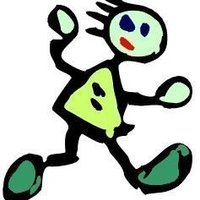
Kikis Clinic
The paediatric physios ( meet our Physiotherapists in london ) at the Kiki’s Children’s Clinic love being with and treating children. They are not only experienced in treating children they also help parents manage the many physical conditions that can affect childhood. Most importantly the approach is holistic and that means they treat the whole child integrating other therapies as required to optimally benefit the child.
Paediatric physios plan and deliver therapy while accounting for and helping the child’s growth and development over time.
If you’re worried about your child… get a physio check – get information – get advice - get going!
Both you and your child will be better taking action – you’ll know if therapy is needed and you’ll know if it is not – either way you’ll be better informed and better able to plan and manage.
Act early - put your mind at rest.
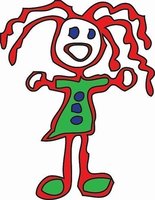
A paediatric physiotherapist is a specialist in movement, and particularly in the motor development of the baby and child. Paediatric therapists treat babies, children and adolescents. Physiotherapists help children achieve optimum physical and mental development aiming not just to help them move but to move to the best of their ability. Children are not small adults.
Typically the therapist encourages the child to move to the best of his / her abilities through play and fun. Don’t forget, paediatric physiotherapists have a special affinity for children – they really like treating and being with them!
As a parent you are well aware that babies and children love movement! Through movement children learn about themselves and their environment. Unfortunately, there are numerous childhood conditions which can affect a child’s physique and his/her ability to move. These conditions can be congenital ( a child is born with them) or acquired, they can be severe or minor and they can be long or short term. Whatever the condition it may reduce the child’s ability to move freely and well. It may affect the physical development , structurally and/or functionally, and it may also impair learning and may lead to a lack of self-confidence.
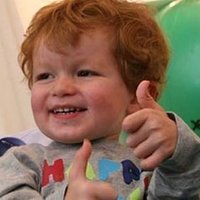
Thumbs Up!
A part of the mainstream modern medical professions, paediatric physiotherapy is holistic in nature treating the whole child, not just the body, or part of the body in isolation.
Following a full initial assessment of the child’s general development and specific physical functions and abilities, the therapist will discuss with the parent the immediate and long term requirements and make a plan for appropriate treatment.
Treatment involves massage, mobilisation and stretching, neuro-developmental therapy, specific therapeutic exercises and posture education. Performed gently and generally without pain, physiotherapy can be a great deal of fun for both the child and the parents. Whatever techniques are used in therapy, enthusiastic parental involvement at home is essential for optimal long term results.
The paediatric physiotherapist can be both a guide and support. They give advice on how to include regular massage, play and other exercises into a child’s daily life, aiming to enhance their overall well-being and quality of life. They also offer suggestions on appropriate footwear, toys, home and school furniture and where necessary special needs equipment.
With any severe or long term condition, such as profound cerebral palsy, the child is usually quickly referred for paediatric physiotherapy by the hospital doctor or specialist. However, much more difficult to identify are the less obvious conditions which can affect a child’s physical well-being and which may become increasingly apparent as your child grows up. Early intervention is vital and many postural problems can be effectively minimised or prevented by starting treatment early, even as early as in babyhood.
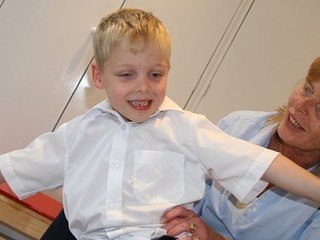
Physio for children - get a physio check if you're worried.
Your child has had his/her 1st birthday.
Please remember that the above are only examples and if your baby or child does present with any one item mentioned it does not necessarily mean that your child is going to have a problem.
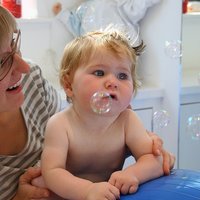
Physio for babies
As a parent you may wonder whether your child has any physical problems and you may have had the following concerns or questions:
Less than 12 months old
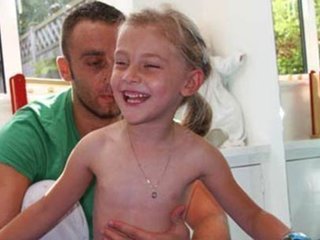
Votja Therapy
Reflexlocomotion was developed by the Paediatric Neurologist, Prof. Dr. Vojta from the beginning of the 1950′s and has been systematically developed since then.
Dr. Vojta observed motor reactions occurring through out the body as a result of specific stimulation given when the patient was placed in specific positions. He established that components of these movements provoked global dynamic muscle activity that are found in all forms of human movement or locomotion. “Global patterns” form the basis of Reflexlocomotion a term that refers to the motor responses resulting from the application of Reflexlocomotion.
Musculature through out the body is activated in a coordinated manner and the nervous system is addressed at all regulatory levels. Besides the skeletal musculature, muscles involved in facial expression, eye movements, the swallowing process, bladder and bowel function, and breathing are also activated. This flow of authentic motor reactions is provoked by graded pressure applied on certain body parts, with the patient placed in specific positions (lying in the back, side-lying, and lying in the tummy). They are part of human movement processes such as grasping, rolling, creeping, crawling, and walking.
The therapeutic goals of Reflexlocomotion are: to facilitate the automatic regulation or control of the body’s position, to facilitate the active maintenance of the support function of the extremities, and to stimulate coordinated muscle activity.
In the practical application, there are two basic coordination complexes:
Global patterns form the basis of the motor rehabilitation of babies, children, adolescents, and adults. It is possible to stimulate these important patterns from early movement like the “building blocks/bricks” of the normal movement in children with movement disorders. In babyhood, Reflexlocomotion is utilized within the framework of early intervention and the best results are gained at this time. At this age the central nervous system’s malleability or “plasticity” is greatest.
Reflexlocomotion can play an important role in the domain of rehabilitation to improve the quality of life in children and adults with motor disorders. A Vojta trained Physiotherapist is responsible for the implementation of the Therapy. The developed “therapy programme” is regularly supervised and matched to the patient’s movement development.
You may wish to refer your child yourself, or the suggestion may come from your GP or the hospital specialist.
It is never too early to seek help, advice and, if necessary, physiotherapy treatment. A “physio check” for your baby or child may simply help to put your mind at rest!
Treatment is available at:
Kiki’s Children’s Clinic
Your home
Your School
Awaiting Content